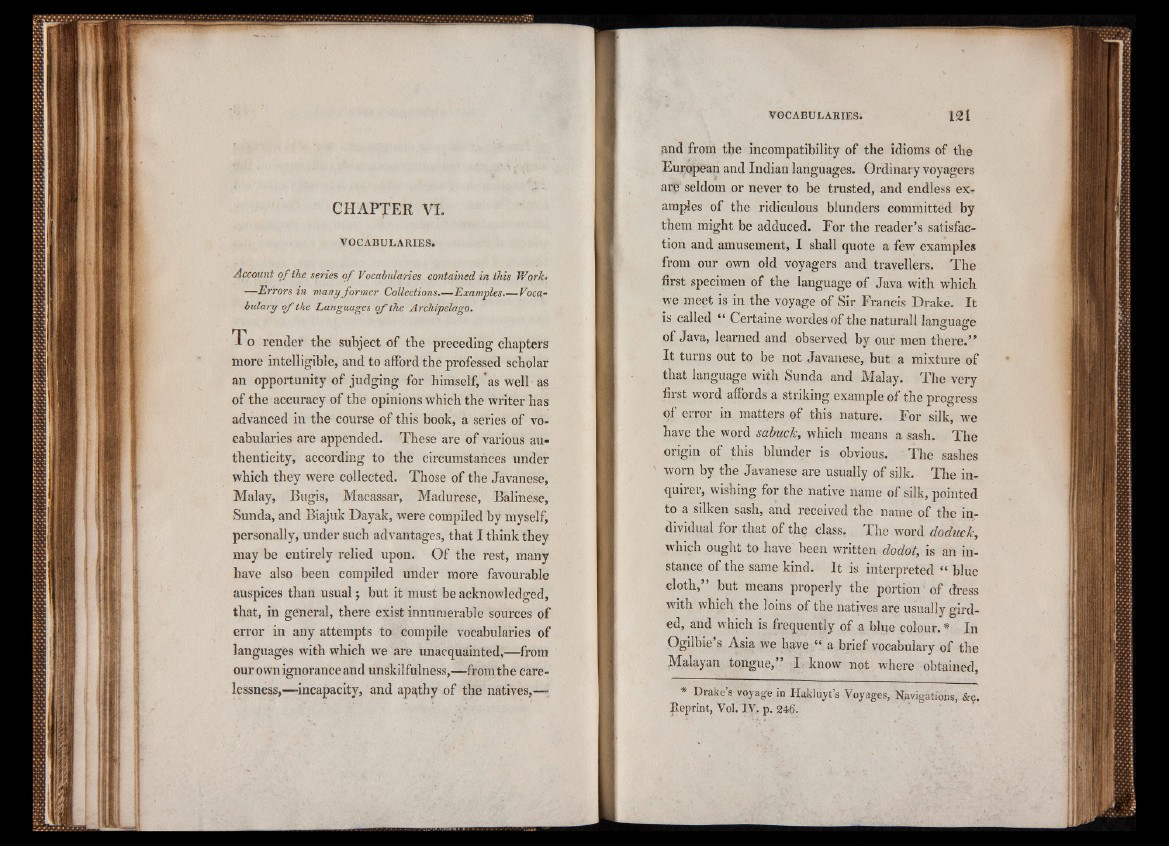
CHAPTER VI.
VOCABULARIES.
Account of the series of Vocabularies contained in this Work.
—Errors in many former Collections.—Examples.—Vocabulary
of the Languages of the Archipelago.
T o render the subject of the preceding chapters
more intelligible, and to afford the professed scholar
an opportunity of judging for himself, ’as well as
of the accuracy of the opinions which the writer has
advanced in the course of this book, a series of vocabularies
are appended. These are of various authenticity,
according to the circumstances under
which they were collected. Those of the Javanese,
Malay, Bugis, Macassar, Madurese, Balinese,
Sunda, and Biajuk Dayak, were compiled by myself,
personally, under such advantages, that I think they
may be entirely relied upon. Of the rest, many
have also been compiled under more favourable
auspices than usual ; but it must be acknowledged,
that, in general, there exist innumerable sources of
error in any attempts to compile vocabularies of
languages with which we are unacquainted,—from
our own ignorance and unskilfulness,—from the carelessness,—
incapacity, and apqthy of the natives,—•
jmd from the incompatibility of the idioms of the
European and Indian languages. Ordinary voyagers
are seldom or never to be trusted, and endless ex?
amples of the ridiculous blunders committed by
them might be adduced. For the reader’s satisfaction
and amusement, I shall quote a few examples
from our own old voyagers and travellers. The
first specimen of the language of Java with which
we meet is in the voyage of Sir Francis Drake. It
is called “ Certaine wordes of the naturall language
of Java, learned and observed by our men there.”
It turns out to be not Javanese, but a mixture of
that language with Sunda and Malay. The very
first word affords a striking example of the progress
of error in matters of this nature. For silk, we
have the word sabuck, which means a sash. The
origin of this blunder is obvious. The sashes
worn by the Javanese are usually of silk. The inquirer,
wishing for the native name of silk, pointed
to a silken sash, and received the name of the individual
for that of the class. The word doduclc,
which ought to have been written dodot, is an instance
of the same kind. It is interpreted “ blue
cloth,” but means properly the portion of dress
with which the loins of the natives are usually girded,
and which is frequently of a blue colour.* In
Ogilbie’s Asia we have “ a brief vocabulary of the
Malayan tongue,” I know not where obtained,
* Drake’s voyage in Hakluyt’s Voyages, Navigations, &c.
Reprint, Vol. IV. p. 246.